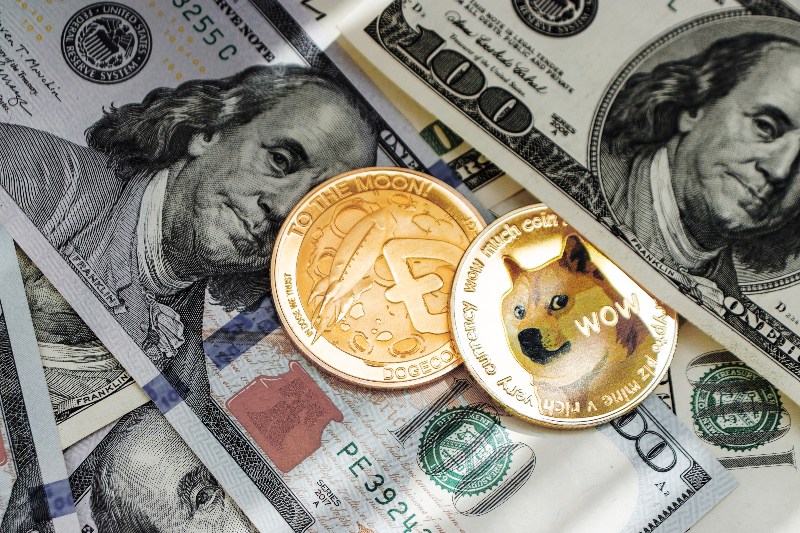2021 in the cryptocurrency sector will be remembered as the year of records and new trends: from the ATHs of many cryptocurrencies, including Bitcoin and Ethereum, through the NFT boom to the China ban, here are the ten facts that marked the year that is about to end.
The ten facts that marked the crypto sector in 2021
Bitcoin’s price record
2021 was an extraordinary year for the entire market, with a bull run marked by major price records for all cryptocurrencies. Bitcoin stands out, which, after its record high at the end of December 2020, when it had touched $20,000 again, went further.
At the beginning of the year, Tesla’s announcement that it had invested in Bitcoin led the queen of cryptocurrencies to a rally that saw it touch $63,000. Then came Elon Musk’s backtrack, the China ban, and the subsequent descent; end of the bull run, many have thought. But no, because in October, BTC has climbed up to almost $ 69,000 last November 10.
The rise of Bitcoin pales in front of the excellent performance of Ethereum. The quintessential altcoin started the year at $736 and came close to lapping $5,000 on November 16, when its climb stopped at $4,900.
If inflation fears persist and the NFT market and DeFi confirm their trend, it’s a safe bet that Bitcoin and Ethereum will continue to set new records in 2022.
The NFT boom
If 2020 was the year of DeFi, 2021 could be said to be the year of NFTs. Non-fungible tokens have actually existed for years. The most well-known example is CryptoKitties, but even the very famous CryptoPunks are dated 2017. Though in 2021, that of NFTs has become a real craze. Statistics say that the market realized volumes of $13 billion and that there were almost 8 million primary sales and 6.3 million secondary sales.
To drag the NFT sector also the entrance of famous people. In the beginning, Jack Dorsey tokenized his first tweet by selling it at auction for 3 million. But also part of this world is the actress Katy Perry, brands such as Nike and Adidas, and sports champions including former soccer glories such as Alessandro Del Piero, Christian Vieri, and Gabriel Batistuta. Also worth mentioning is director Quentin Tarantino who tokenized some sequences of his cult film Pulp Fiction, running into legal problems. Because this opens up a question: whose copyrights are in a creation transported on the blockchain? Jurisprudence is being called upon to answer.
The year of goodbyes
The year 2021 will also be remembered as the year of goodbyes. Jack Dorsey has stepped down as CEO of Twitter. After founding one of the best-known social networks, last November 29, Dorsey announced he was leaving Twitter, not before introducing tips with Lightning Network. In his future, there is Block (former Square), the other company he founded, and that wants to contribute to the spread of Bitcoin.
A few days later, from the parts of Meta (former Facebook), also David Marcus announced his farewell to the company and to the Novi project, the wallet that should keep the Facebook cryptocurrency, Diem, which is still not launched on the market. In his farewell post, Marcus spoke of an exciting project with much to do. Who knows if Diem will arrive in 2022.
The last farewell is that of Justin Sun to his creature: Tron. According to him, Tron has reached full decentralization. A diplomatic career opens up for him. He will represent Grenada (the Caribbean island where he has lived for years) at the World Trade Organization.
The year of the meme stock: the Gamestop case
The year 2021 was also the year that revolutionized finance, democratizing it. It happened thanks to an app, Robinhood, a social network, Reddit, and a group, WallStreetBets. These three ingredients are channeled in one direction: Gamestop.
The company is a chain of game stores. Unable to adapt to the changes mandated by the digital age, Gamestop was on the brink. Hedge funds were buying its stock short and betting on its decline. Until a large group of “retail” traders gathered in the WallStreetBets forum on Reddit deciding to pump GME stock, buying it en masse. The result was a short squeeze that sent Game Stop’s share price soaring, putting a couple of hedge funds suddenly short of resources and with massive debt due to the rising value of shares they had borrowed into crisis.
After Gamestop, it was AMC’s turn, and the world started talking about meme-stocks: shares in companies that are apparently worth little, that suddenly explode. Thanks to apps and social networks, finance now belongs to everyone.

The meme coins: from Dogecoin to Shiba Inu
WallStreetBets has also found its natural landing place in the world of cryptocurrencies, pumping in this case too a cryptocurrency apparently under the radar: Dogecoin.
Born as a joke in 2013, DOGE was already popular thanks to Elon Musk’s tweets. But with subsequent pumps piloted by WallStreetBets, it experienced a major price rise, up to the record of 73 cents set in May. At the beginning of the year, DOGE was worth only 4 thousandths of a dollar for the record.
Dogecoin’s rise has triggered the birth of other meme coins. One of them has climbed the Coinmarketcap rankings: Shiba Inu. Like DOGE, SHIBA also uses the dog’s namesake as its logo. Like DOGE, SHIBA doesn’t have its own utility, but it does have a goal: to be the Dogecoin-killer. But unlike Dogecoin, it does not enjoy the support of Elon Musk. It remains one of the most discussed cryptocurrencies at the moment, a protagonist of ups and downs in the market, which for a moment even led it to crown its dream: overtake Dogecoin. But it was short-lived. We will see if, in 2022, Shiba Inu will be able to undermine the dominance of Dogecoin. Both will still have to watch their backs against the hundreds of other meme-coins that have sprung up in the meantime.
China bans Bitcoin mining
Making this 2021 troubled was China, which banned Bitcoin mining last May. The decision came as an earthquake to the market, causing sudden drops in BTC price after the previous record high in April at $66,000.
For the price, it was just a setback. For mining, however, everything has changed. From being the world leader in Bitcoin mining, China has zeroed out its hashrate. Miners have moved to other places: Kazakhstan, the United States, and Russia. There remains the problem of high energy use and the need for green sources. But this is an issue that now no longer concerns Beijing.
El Salvador adopts Bitcoin as legal tender
For a country that bans Bitcoin, there is another that adopts it. That’s El Salvador, a nation of just over 6 million people in Central America. Thanks to the “Ley Bitcoin” and the happy intuition of President Nayib Bukele, since September 7, Bitcoin has become legal tender and now coexists with the dollar. That means that in El Salvador, you can pay anywhere in Bitcoin or dollars, and you can also get paid in Bitcoin (or dollars).
The choice has proven to be a success, at least for adoption. Accomplice to a $30 Bitcoin bonus, the population has downloaded the Chivo wallet in droves. In addition, President Bukele started buying Bitcoin at every market drop, building a fund with which he progressively arranged to construct hospitals and schools.
Despite the skepticism of the rest of the world, El Salvador is proving to be a large-scale experiment in the use of Bitcoin. And it is not out of the question that in 2022 other countries may follow suit.
Craig Wright wins case against Ira Kleiman
The year 2021 is coming to a close, and the cryptocurrency community is still unsure who invented Bitcoin. Those who hoped that the ruling in the lawsuit between Craig Wright and Ira Kleiman would at least give a clue were disappointed.
In the ruling, Craig Wright was ordered to pay $100,000 to the family of his deceased former partner Dave Kleiman, but he will not have to give half of the Bitcoins contained in the Tulip Trust, the wallets where 1 million BTC mined in the so-called Satoshi Era are contained.
The ruling convicts Craig Wright on copyright issues but says nothing about the ownership and identity of who actually mined those BTCs. Had he done so, the judicial truth could have rewritten Bitcoin’s history, sanctioning that Craig Wright was indeed behind Satoshi Nakamoto, as the Australian entrepreneur has long claimed.
Whatsapp heads Novi
We close this news roundup with the last two that relaunch towards innovation. Digital payments are coming to Whatsapp, at least, this is implied by the news that announces that the messaging app is testing Novi, the wallet developed by Meta, and that must accommodate the cryptocurrency, Diem. The test is ongoing in the United States and allows a limited number of users to exchange money via the app.
When the testing phase ends and the feature is finally implemented, another era for payments will begin, and who knows, it might not involve cryptocurrencies as well.
From Meta to metaverse
Finally, 2022 promises to be the year of the metaverse. This trend has been sanctioned by Facebook, which has changed its name to Meta, announcing its intention to devote itself to the construction of social in virtual reality.
The world of NFT has also found its natural landing place in the metaverse. Some projects were already a reality even before the launch of Meta, such as Decentraland and The Sandbox, and it is no coincidence that their tokens have risen in price.
Others are developing, and in 2022 they promise to contribute to a radical change: bringing humankind together in a virtual space by breaking down distances in a simulated environment.
The post Bitcoin, NFTs, metaverse: the cryptocurrency industry’s 2021 appeared first on The Cryptonomist.




















